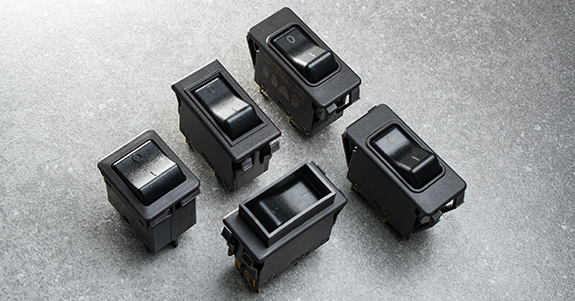Hello,

Recently we covered fuses as circuit protection. While circuit breakers and fuses have the commonality of stopping the flow of electric current when rapidly overloaded, there are important differences.
Circuit Breakers
As mentioned in a recent InfoPower blog post, circuit breakers are automatic switches that prohibit the flow of electric current when rapidly overloaded or unusually stressed. Similar to a fuse, a circuit breaker can open the circuit pathway in the event of an overload or short circuit. Unlike a fuse, however, a circuit breaker is reusable and is available in a manual or automatic reset.
A manual reset requires the user to press a button or move a lever to reset the circuit pathway. An automatic reset will return to normal functioning once normal conditions resume. When voltage is pushed at a rate faster or greater than the circuit breaker is designed to handle, the switch contacts open, breaking the current. This occurrence is often referred to as being “tripped.” When the issue is resolved (whatever tripped the circuit is repaired), the circuit breaker can be reset. The contacts will remain closed unless another overcurrent fault condition occurs in the protected circuit, causing it to trip again.
Aspects of a Circuit Breaker
Circuit breakers are designed to protect against low-level faults—they are not designed to handle high-voltage levels. A circuit breaker is not a surge suppressor for catastrophic events such as lightning strikes.
Typically, circuit breakers tend to trip less quickly than when exposed to high overloads. They also provide a clear audible indication of being tripped as opposed to a fuse whose contacts melt inside an insulated housing.
Because a circuit breaker’s design allows for repeated use, it eliminates the possibility of a fuse replacement whose rating is incorrect, leading to an injury or equipment damage. A circuit breaker is larger in size than a fuse, which will take up more panel space. If the circuit breaker does become disabled, it may require a technician to replace it which could lead to expensive repairs. However, typical circuit breakers can be purchased in sizes such as 4A, 10A, or 15A while fuses typically come in milliamps such as .032A, .080A, or 1.25A.
The bottom line: Is a circuit breaker or a fuse best for your design? While a circuit breaker is initially more costly to purchase off the shelf, over time the strength and life span of a circuit breaker (arc strength, setting time, ambient temperature resilience) may play a vital role in determining what’s best for your circuit protection. The design of the circuit breaker allows for repeated use, and can be used many times before being replaced, which should make up for the initial purchase cost over time.
